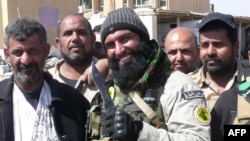Abu Azrael—the "Father of the Angel of Death"—an Iraqi Shia commander, brags that he once beat a man to death with a plastic flip flop.
His biceps are as big as cannonballs, and he rides into battle on a bicycle (he really does). Commander Abu Azrael wears a Kevlar vest, with hatchet in hand, a sword, grenades and an automatic assault rifle.
He claims to have killed 1,500 Islamic State (IS) fighters in a single year, and it's rumored that IS is so terrified of him that it will kill anyone who utters his name.
Abu Azrael's shaved head, black beard and gleaming teeth have made him the most recognized face in the region, and he has inspired cartoons, music videos and even Android game apps. His battle cry, “Illa tahin!” ("Into flour!" -- as in, “I’ll pound IS fighters into flour”) has caught on everywhere.
“The way he was introduced to people was via internet memes," said Phillip Smythe, a University of Maryland researcher and author of the blog Hizballah Cavalcade. "You see this big, muscled guy. Sometimes he has an axe, sometimes he has a sword. Sometimes he's in a helicopter on a door gun."
But who, exactly, is this man?
"There are a lot of rumors,” said Smythe. “Some claim he is a former university professor. Others that he is a former Taekwondo champion. Still others claim that his entire village was wiped out by ISIS, so that’s why he took up arms.”
His real name is reported to be Ayyub Faleh al-Rubaie, and he allegedly serves as a commander in Kataib al-Imam Ali, part of the Popular Mobilization Forces, a coalition of dozens of Shia militias sponsored and armed by the Iraqi government and suspected of wide rights violations.
In August 2015, a video emerged which showed Abu Azrael desecrating the burned corpse of an alleged IS fighter.
"You won’t get far against the Daesh [another acronym for IS] with humanity," he later told the Australian newspaper.
IS retaliated by burning four captured Shia "spies."
In late 2015, rumors circulated that IS had captured and killed Abu Azrael. But he recently resurfaced in Fallujah, vowing to liberate that city from IS hands.
"The Sunni perception of Abu Azrael varies from indifference to absolute loathing," said Rasha Al Aqeedi, a fellow at the Al-Mesbar Center, a UAE think tank. "Overall, he is viewed as a thuggish, sectarian outlaw."
In video recordings, Abu Azrael has reassured Sunnis that he views them as his brothers, said AlQeedi, and that his only enemy in this conflict is IS.
"However, on several occasions, has been caught on tape cursing revered Sunni religious figures and threatening to abolish their 'offspring' —which is another way of threatening all Sunnis and lumping them together with ISIS," she said.
And some people think he spends more time taking selfies and group photos than fighting in actual battle, she added.
Those photos plaster the internet: In one, he flexes his muscles at a Baghdad gym. In another, he aims his rifle at a tiger. He once attended Mass in a Baghdad church, posing with the priest and patting a bible."I would make the argument that he is a completely manufactured personality,” said Smythe, suggesting Abu Azrael is a propaganda tool of the Iran-backed government in Baghdad.
“The whole point of the narrative is to legitimize these Shia militias, particularly the Iranian-backed groups like Hezbollah, and to portray them as the true defenders of Iraq, the true allies of other embattled minorities in the region," he said. "The way that they have played this off? He's a romantic hero. He's a guy you want to be with."
When you think about it, Smythe added, "it’s absolute genius."




